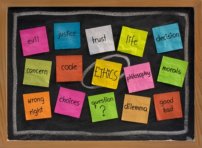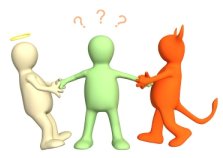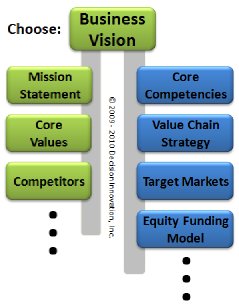Addressing Ethics in Decision Making
It is our intent to focus on the practical application of ethics in decision making. We need to start by creating some clarifying distinctions to facilitate our purpose. First, we must acknowledge the vast amount of research and study on the topic, and recognize that our application of ethics within business decision making, only addresses a small portion of the much broader topic. Second, our goal is to address decision making ethics in view of our decision making model in a way that will enable a consistent application of ethics in the decision making process.
Distinguishing Morals from Ethics in Decision Making
 In our research we have found an overwhelming amount of information just to address the meaning or distinction between "morals" and "ethics." There are a large range of views that include the words being synonyms and the word ethics being "moral philosophy," or the study of moral principles. Both relate to determination of right conduct.
In our research we have found an overwhelming amount of information just to address the meaning or distinction between "morals" and "ethics." There are a large range of views that include the words being synonyms and the word ethics being "moral philosophy," or the study of moral principles. Both relate to determination of right conduct.
For our purpose we will reserve the term "moral" for use in a personal decision making context. This means that we will use "moral" when dealing with personal or life decisions with a focus on "right conduct" as the result of a personal choice. Ethical decision making will be reserved for use in a group decision making context. Specifically, we will address ethical decision making in business as providing the guiding requirements or goals for right conduct. These requirements often come as the result of organizational definition, agreement, or long-standing custom. There is clear recognition that ultimately a personal choice must be made with respect to right conduct, but business ethics will provide the assessment framework for correct behavior in the business organization.
How Important is the source of ethical standards in business decision making?
 A large portion of the study of ethics deals with the approach or source of the principles or standards to be used for ethical decision making in business. A number of schools of thought have developed that include the following approaches (in no specific order):
A large portion of the study of ethics deals with the approach or source of the principles or standards to be used for ethical decision making in business. A number of schools of thought have developed that include the following approaches (in no specific order):
- Utilitarian
- Moral rights
- Universalist
- Cost-benefit
- Fairness or justice
- Common good
- Virtue
- Deontological (based on study of moral obligation)
- Theological
- Contextualist
- Principle-based
- As well as others
The good news is that, in general, most approaches will lead to similar choices for most decisions involving ethics. There are obvious and sometimes notable exceptions, but these often involve ethical dilemmas that can only be addressed in the context of the specific decision being made.
Ethics in decision making impacts the choices for words and actions
 In confining ethical decision making to a business or group context, decisions on ethics are necessarily limited to actions and words (e.g., no deceit in sales promotion, use words to manipulate performance, ...). Right behavior can be evaluated though actions and words, but there is no way to know one's thoughts. Per our distinction, thoughts and beliefs (e.g., I want to help and benefit my customer as opposed to I want their money without regards to what is right, personal gain at the cost of someone else's reputation, ...) will be confined to moral decisions that are part of personal decision making.
In confining ethical decision making to a business or group context, decisions on ethics are necessarily limited to actions and words (e.g., no deceit in sales promotion, use words to manipulate performance, ...). Right behavior can be evaluated though actions and words, but there is no way to know one's thoughts. Per our distinction, thoughts and beliefs (e.g., I want to help and benefit my customer as opposed to I want their money without regards to what is right, personal gain at the cost of someone else's reputation, ...) will be confined to moral decisions that are part of personal decision making.
Clearly our thoughts affect our words and deeds, and in a group context, ethics in decision making can be evaluated through the tangible evidence and outcomes from words and actions. Again, thoughts and motivation are left to the personal realm. As a consequence, evaluation of appropriate ethical behavior will have limitations. In all outcomes there are the following possibilities:
- Right motivation with right action
- Right motivation with wrong action
- Wrong motivation with right action
- Wrong motivation with wrong action
Given the difficulty in exposing true motivation, ethical assessments will inherently be limited to an evaluation emphasis on action or outcome.
Will an immoral person make an ethical decision or a moral person make an unethical decision?
Most certainly. However, those that seek to make moral personal decisions have the will or desire to seek what's right over the long term. This will be reflected in their ethics in decision making (decisions made in the business context). There will also be the case where a person's morals may come into conflict with the organization's ethics. Expect this to be the greatest source of dilemmas in ethics and decision making in an organizational context.
How do we incorporate ethics in decision making using our decision making process?
 Addressing ethics in decision making in business or other large organizations or groups (e.g., government) does point to the need to ensure that key focusing decisions (the decisions highlighted in green) have been made and are in place. In particular, the business decision for core values should be in place to provide the goals/requirements that will be used to create and constrain the criteria used in the network of business decisions. This focusing decision can influence criteria for decisions throughout the network of business decisions (the decisions in blue), directly influencing ethical decision making and organizational conduct. Additional related decisions include choosing the business mission and the code of conduct that will add compliance criteria to decisions across the business decision network.
Addressing ethics in decision making in business or other large organizations or groups (e.g., government) does point to the need to ensure that key focusing decisions (the decisions highlighted in green) have been made and are in place. In particular, the business decision for core values should be in place to provide the goals/requirements that will be used to create and constrain the criteria used in the network of business decisions. This focusing decision can influence criteria for decisions throughout the network of business decisions (the decisions in blue), directly influencing ethical decision making and organizational conduct. Additional related decisions include choosing the business mission and the code of conduct that will add compliance criteria to decisions across the business decision network.
Here are some criteria that can help ensure appropriate ethical considerations are part of the decisions being made in the organization:
- Compliance - Does it conform to the company's values and code of ethics? Does it meet (should exceed) legal requirements?
- Promote good and reduce harm - What solution will be good to the most people while minimizing any possible harm?
- Responsibility - What alternative provides the most responsible response? Does the solution ensure meeting our duties as a good corporate citizen?
- Respects and preserves rights - Does the option negatively impact an individual's or organization's rights?
- Promotes trust - Does the solution lead to honest and open communication? Is it truthful? Is there full disclosure?
- Builds reputation - Would a headline of your decision generate pride or shame? Does your solution add to or detract with the identity you want for the organization?
When is the best time to address personal morals versus organization ethics?
Future conflict between a person's moral choices and an organization's ethical decisions are most easily addressed as someone seeks to join the organization. If a person is ready to join a company or business, it is important that he (or she) be presented with the company's core values and code of conduct (if available). The prospective new member must then determine if it is possible to reconcile their moral choices with the organization's ethics as conveyed in the company's values and code of conduct. Agreement to join the company implicitly assumes that this reconciliation has taken place, but it can be made explicit by requiring agreement to a code of conduct.
Given this understanding that should exist between the company and the individual, a change to the company's values and code of conduct should be given careful consideration. Changing the basis for the organization's ethics in decision making, in theory, requires a new agreement with each individual to reconcile with their personal moral choices. In practice, this change can lead to conflict as an individual's morals now lead to choices that violate the company's decision making ethics.
Return from Ethics in Decision Making to Business Decision Making

